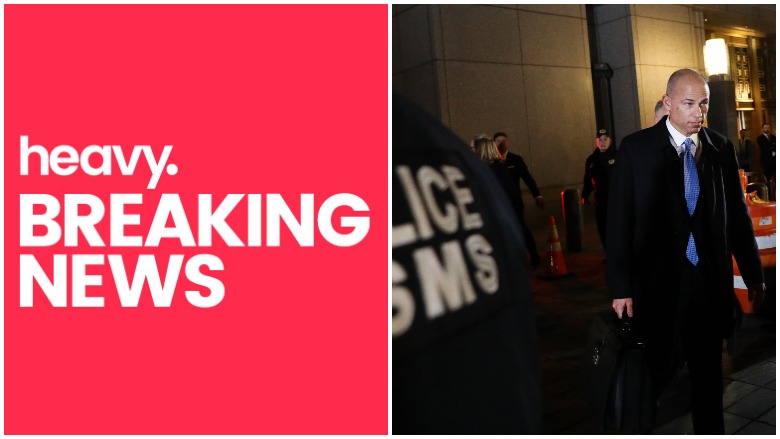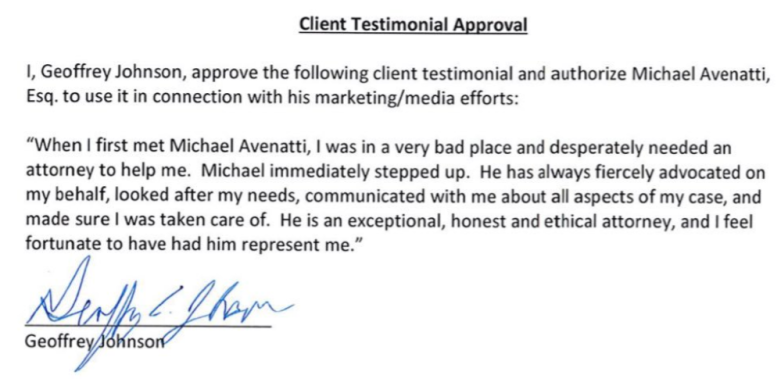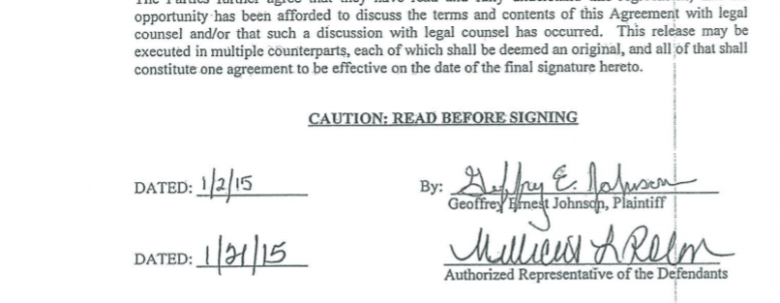
In the U.S. District Court for the Central District of California grand jury indictment against high-profile attorney and formerly potential 2020 presidential candidate Michael Avenatti, Geoffrey Ernest Johnson is referred to as ‘Client 1.’
But Johnson’s identity has been public since 2013 when Avenatti began to represent him.
Johnson, who has been described in court documents as a paraplegic man suffering from mental health issues, was arrested in 2011 after having a psychotic episode where he tried to commit suicide. While in the LA County Sheriff’s lockup, Johnson was abused, beaten, threatened and placed in unsafe and inhumane conditions with his serious mental health conditions ignored.
Avenatti successfully argued that Johnson’s constitutional rights were violated and that he suffered extreme emotional and physical injury, namely “paraplegia.”
In 2015, a settlement was reached and Johnson was awarded $4 million.
The government alleges Avenatti embezzled much of that money.
In a text message response to Heavy’s request for comment, Avenatti pointed to his tweet Thursday morning, which he says, “addresses it all.”
In a statement to USA Today, Johnson’s new lawyer said Avenatti committed an “appalling fraud” against Johnson.
“Mr. Avenatti stole millions of dollars that were meant to compensate Mr. Johnson for a devastating injury, spent it on his own lavish lifestyle, then lied about it to Mr. Johnson for years to cover his tracks,” lawyer Josh Robbins said.
Here’s what you need to know:
1. Prosecutors Say Avenatti’s Alleged Fraud & Embezzlement Schemes Turned Clients Into Victims by Embezzling $12 Million
According to the indictment, Avenatti would negotiate a settlement on behalf of a client and then “misrepresent, conceal and falsely describe” the payout terms. The indictment reads that Avenatti would have the settlement monies, millions of dollars, transferred into accounts he controlled “misappropriating settlement proceeds to which he was not entitled.”
Court documents read Avenatti would “lull” clients from discovering the embezzlement and misappropriation by saying the settlement had not yet been paid, or sending small amounts to clients calling those payments “advances” and “falsely claiming that payment of the settlement proceeds to the client had been delayed and would come in a later time.”
In the case of Johnson, Avenatti took the deception a lot further, the government said.
According to the indictment, Avenatti told Johnson the settlement agreement had to remain confidential, the County of Los Angeles could not pay the settlement in one lump sum and, and no monies would be paid until the County approved a “special needs trust.”
Prosecutors say the settlement agreement did not contain a confidentiality provision, the county agreed to make a lump sum $4 million payment and the payment was never conditioned on the approval of a special needs trust, according to court documents.
Avenatti received the settlement and deposited into accounts he controlled.
3. Prosecutors Allege Avenatti Embezzled Millions in Settlement Money for 5 Clients & Used Those Monies For Personal Expenses, Including a Jet, & to Support His Race Car & Coffee Businesses
By depositing settlement monies in a number of accounts he controlled, including ones that supported his coffee business, Global Baristas, and his race car team’s business, GB Auto, prosecutors allege he embezzled millions. According to the indictment, there were more than 15 accounts, some trusts, and monies were moved from one to another, prosecutors allege some in support of already illegal maneuvers.

GettyThe partly owned by Mike Avenatti is shown in action at night during the 12 Hours of Sebring at Sebring International Raceway on March 15, 2014.
The 36-count indictment describes a mind-bending and intricate web where the attorney used monies to cover failing businesses and his upscale lifestyle all the while, it’s alleged, he was not paying payroll taxes on his coffee business, Tully’s and making cash deposits from that business to another.
3. Of the $4 Million Settlement Avenatti Won For Johnson, a Mentally Ill, Suicidal Paraplegic, Prosecutors Allege Johnson Got Around $125,000 in Total From His Lawyer
The government said from July 2015 until March 2019, Avenatti made 69 payments to Johnson ranging from approximately $1000 to $1900 for a total of around $124,000.
Avenatti also made payments to assisted living facilities for Johnson’s care, but prosecutors say he told his client those monies were just advances from the settlement.
In April of 2011, the LAPD responded to a call and found Johnson “completely naked, praying in the middle of the street outside his apartment building.” He was transported to the hospital where he exhibited “severe suicidality” fully intending to kill himself. Court documents read that Johnson “believed that the only way to escape the plot of others to kill
him was to commit suicide (by) jumping off the roof.”
Johnson was suffering from delusions wherein he thought “there was a plot/conspiracy to kill him by burying him alive [and] he needed to kill himself first.” He had auditory hallucinations, heard “God’s voice” and exhibited “erratic behavior. When police tried to talk to him he was alleged to have lunged at a doctor and was promptly arrested.
Here’s the full case:
Johnson was denied access to mental health care and was put into a cell in the Twin Towers Correctional Facility, a Los Angeles County jail, with an inmate known to be violent, and who beat Johnson while being watched by corrections deputies. When he was released, deputies took him on a ride and threatened him.
The case brought against the then-sheriff and deputies, claimed that Johnson was purposely placed in unsafe and inhuman conditions and, as a suicidal person, was deliberately placed in locations where Johnson would have been able to commit suicide.
Ultimately, after being emotionally and physically abused by inmates and deputies, he was again hospitalized with severe injuries. The charges against him were dropped.
In 2013, Avenatti took his case. And won. But the allegations against Avenatti now are that he stole much of the money intended for Johnson.
Avenatti denies the charges emphatically.
4. Prosecutors Say Avenatti Stopped Johnson From Buying a House & Failed to Comply With Efforts to Save Johnson’s Disability Payments
According to the indictment, in 2017 Johnson wanted to buy his own home and Avenatti promised him he could use the settlement proceeds to do that but then told Johnson he could not purchase the house after all because the county didn’t approve the special needs trust. Which prosecutors allege was bogus. Johnson lost the house.
In November of 2018 the Social Security Administration wanted to evaluate Johnson’s eligibility for SSI benefits. The indictment alleges that Avenatti failed to provide the requested information which resulted in Johnson losing his benefits.
By last month, when Avenatti found himself in court, the government alleges he told Johnson that the county finally approved the special needs trust and that Johnson would start getting the money.
The day after, he had Johnson sign a “testimonial.”
5. Avenatti Had Johnson Sign a Document That Described the Lawyer as ‘Exceptional, Honest & Ethical’
“Any claim that any monies due clients were mishandled is bogus nonsense. By way of example only (there are MANY more like this), here is a document Mr. Johnson signed less than a month ago attesting to my ethics and how his case was handled. I look forward to proving my innocence.”
Prosecutors allege Johnson signed under duress.
“When I first met Michael Avenatti, I was in a very bad place and desperately needed an attorney to help me. Michael immediately stepped up. He has always fiercely advocated on my behalf, looked after my needs, communicated with me about all aspects of my care, and made sure I was taken care of. He is an exceptional, honest and ethical attorney, and I feel fortunate to have had him represent me.”
Johnson signed.
But the signatures do not match.

